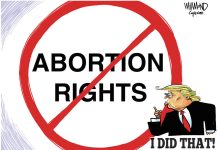Just over a century ago, a 62-year old high school dropout and former railroad worker stepped before a small crowd at a picturesque public park in Canton, Ohio. The orator, a resident of Terre Haute, proceeded to give an impassioned speech that discussed the plight of the working class.
The speaker, famed labor leader Eugene V. Debs, warned of the dangers of suppressing free speech. Debs also denounced corruption and urged his listeners to support equality. The main message of the speech was an argument against fighting in World War I. He argued that throughout history, elites, wealthy and ruling classes would declare war and benefit while the working class would fight and die. After the speech, authorities arrested Debs for sedition.
Debs does not garner the same level of attention that other politicians such as Abraham Lincoln, Richard Lugar, or Dan Quayle, who also have ties to Indiana. That is a shame. Debs was an influential and important political figure.
After the United States entered World War I, President Woodrow Wilson’s administration suppressed civil liberties and quashed free speech in an effort to convince Americans to fight. The Great War had been a futile bloodbath. The nations at war were determined to strengthen their empires. By 1917, it was a stalemate, with millions dead and many of the combatant countries on the brink of ruin. Debs, along with many Americans, had grave reservations about joining the conflict.
[sc:text-divider text-divider-title=”Story continues below gallery” ]
In September 1918, a court found Debs guilty. Unrepentant, Debs delivered an eloquent and ultimately vain speech. Debs told the court, “Years ago I recognized my kinship with all living beings, and I made up my mind that I was not one bit better than the meanest on earth. I said then, and I say now, that while there is a lower class, I am in it, and while there is a criminal element I am of it, and while there is a soul in prison, I am not free.” The court sentenced Debs to 10 years in prison and stripped him of his right to vote.
Debs knew first-hand of the dangers of industrial life of the era. Debs worked as a fireman for the Vandalia Railroad. Thousands of railroad workers died every year on the job. Workers endured low wages and dangerous conditions. They often lived in towns where their employers owned housing and stores.
Debs became a union organizer, working his way into local politics. He won an election to the Indiana House of Representatives in 1884. Debs came to national prominence during the Pullman Strike in 1894. He spent six months in jail for supporting the strike. Over time, Debs became an increasingly ardent socialist.
Debs ran as the Socialist Party candidate for president of the United States in 1900. Although he never came close to winning, that did not stop him from trying. He ran four additional times. In 1912, Debs garnered nearly 6 percent of the popular vote with more than 900,000 ballots cast for him. During the 1920 campaign, he ran while still a guest of the federal government at the federal penitentiary in Atlanta.
While never a serious threat to the Republican or Democrat candidates, Deb’s message resonated with many Americans. They shared his concerns over workplace safety, child labor, the struggles of the working class and growing wealth inequality. His failed presidential campaigns also underscore the difficulties of third party candidates in our political system.
In 1921, with the war over and Debs’ health failing, President Warren G. Harding commuted his sentence and even hosted him at the White House. He was also nominated for a Nobel Peace Prize. I may not agree with all of Debs’ political views, but I certainly admire his courage, conviction and willingness to speak truth to power.
Debs’ house is now a fascinating museum near the campus of Indiana State University. If you are looking for an excuse for a road trip this fall, take the back roads to Terre Haute and learn more about an Indiana iconoclast.
Aaron Miller is one of The Republic’s community columnists and all opinions expressed are those of the writer. He has a doctorate in history and is an associate professor of history at Ivy Tech Community College — Columbus. Send comments to [email protected].




